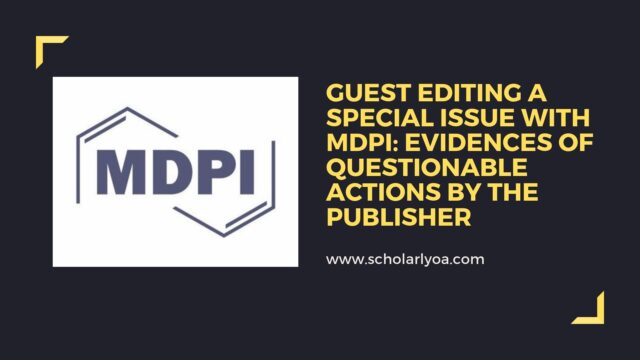
Note: I received the message below from a scientist who served as a guest editor for a so-called special issue of one of the many MDPI journals. The message comments on and describes the scientist’s experience working with MDPI, a publisher included on my list. The statement was endorsed by interviews with other guest editors involved in recent special issues. The scientist has asked to remain anonymous.
I recently read your post about MDPI’s “special” issues and decided to contact you to explain why MDPI is a questionable publisher by all means.
Unfortunately, I realized that while serving as guest editor in one of their special issues…
As a young scientist, I received an email a while back from the publisher inviting me to guest edit a special issue in one of their journals. I thought it weird, but they said they would do all the work on my behalf, so I thought again: Why not? … and accepted the invitation.
Soon after the website of the special issue was launched, they sent me an extensive mailing-list of authors that they were going to invite (more than 500!)… and a few days later, when I asked, I received the news that all invitations were already sent…so I thought, WOW how efficient they are!

That intrigued me, so I decided to take a look again on the mailing-list and check the record of some authors (since most of them I never heard about); to my surprise, most of them had absolutely nothing to do with the field of the special issue. I immediately asked the editorial office who was responsible for selecting the names, and how they were “selected”. The answer was astonishing:
The names were “selected” from the Web of Science Core Collection, based on some keywords (those that you find in each website of a special issue) during the last 5 years… so the selection process is completely random. The output is a list with the last name and the email of the corresponding authors (these lists may be composed of 500, 1000, 2000 or even more contacts). After that, they have a software that send all invitations at once! As I noted, no checking is done (they just grab the list and send the invitations through the software) !!!
That’s why they send massive emails… and that’s why most authors receive invitations that have nothing to do with their expertise. Their names were randomly picked by a software, based in a keyword match!
I was quite embarrassed with the situation, but as I have accepted the invitation, I could not step down at that stage… so I waited to see the result. As I was expecting, only a few authors submitted (poor quality) manuscripts…all completely unknown in the field… all Chinese or from weird universities. I just knew that at the final stage, because the own editorial office selects the reviewers (the selection process is the same as previously informed for the authors).
After the experience, I also realized that the EiC never was informed about the special issue or its development (not a single cc email to him). Even during the initial phase, on discussing the topic of the issue, all my conversations were only with the Chinese assistant editor, which is the real editor of the journal (the EiC is just a figurative name, who accepted the position because the publisher does all the “work” — in fact, a Chinese employee from MDPI with no scientific expertise does all the work). Well, if the EiC does nothing, what to say about the editorial board? So, although MDPI has an office in Switzerland (probably because of the easy way to open a company there), all work is done by low level Chinese employees, with no scientific expertise, trained only to keep the machinery running.
So, it is evident that most of the EiCs and board members from MDPI journals are not aware on how the journals they are supposed to be leading are indeed being “developed”, which explains why there are so many problems. e.g. beyond the low quality of the authors in each issue (which may be called opportunistic authors), it is common to publish papers not related to the issue. Basically, the editorial office sent random invitations and anyone who suggest anything will be guest editing a special issue with them!
I recently also noted that they have a strategy of re-launching the same special issue to give a false impression, so the special issue appears more qualified. Plus, they hide some dead projects (probably to re-launch later, just changing the deadline, as nothing happened before). As you may see, these two hidden special issues (http://www.MDPI.com/journal/genes/special_issues/cancer-gen ; http://www.MDPI.com/journal/genes/special_issues/genomics-aging), are not listed on the journal’s website (http://www.MDPI.com/journal/genes/special_issues).
For example: The deadline for this issue just closed: But if you see, the first paper was published in 2012!!! So, four years receiving contributions and only 5 papers were published so far!
The same goes for this special issue.

I got examples from Genes because of its particular feature, i.e. this journal has been indexed in Web of Science (as highlighted on its website). This raises the question: why do PubMed and Web of Science index journals from this publisher? As far as I know, PubMed and Web of Science have strict criteria for inclusion on its databases. But, why then these clearly questionable journals are included? As I know, there are journals kicked out of Web of Science because they were manipulating their own citation rate to increase the impact factor. But why Web of Science also does not kick out these journals which are based in all kinds of questionable actions???
It is also interesting how MDPI try to deceive people. Yes, probably all members on their editorial boards accepted the (random) invitation to be there; but none of them does anything (even most of the EiCs, I believe). Yes, MDPI probably perform peer review to all submitted manuscripts; but what about the quality of these peers? Probably, most of them are unknown… that’s was my experience when I checked the referees selected for the papers from my special issue. Sometimes, more than 20 referees were invited, and only (usually two) unknown names accepted. I truly believe they choose (again, randomly) low quality referees, so the papers can be easily accepted; if there are critics, they just have to say: hey, we did peer review (as they already did in several cases)!!!
Also interesting is that the machinery behind their questionable way of profit has been well hidden. I would like to see them explaining to the public how potential authors have been “selected” and how they are invited (i.e. all invitations sent at once by their software). Considering that a single journal like Molecules has so many special issues each month (something over 10!), and MDPI has 137 journals, could you imagine how many invitations are sent by the publisher within a single month?!!!
Of course, the heads of MDPI will certainly deny these facts, as they are used to… probably saying again: “We ensure that messages are directed to researchers who match the scope of the invitation and do not, for example, purchase lists of contacts from third parties”. But the fact is that: the many examples of random emails sent by them, the many published papers not related to the issue, among many other aspects, clearly demonstrate the true nature of MDPI, i.e. a highly questionable publisher.
For these reasons, it will be good to expose the questionable machinery behind MDPI to the scientific community. Probably, most predatory open access publishers do the same.












